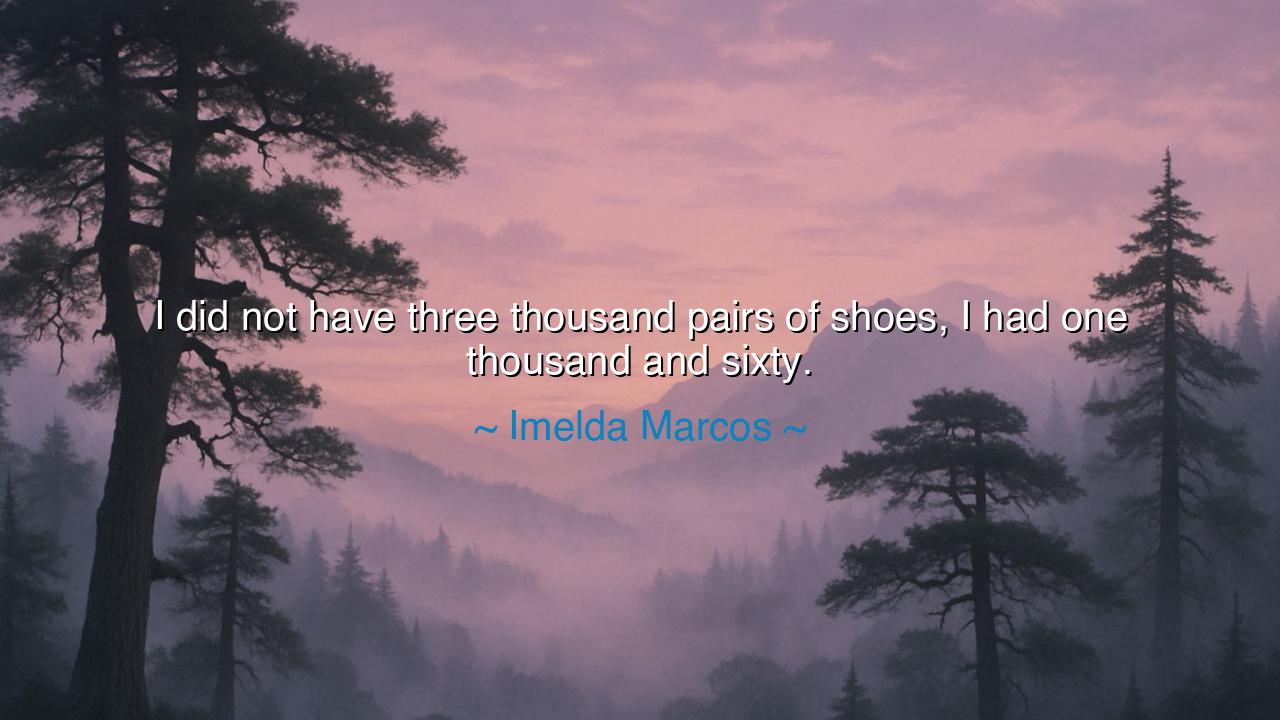
I did not have three thousand pairs of shoes, I had one thousand






In the grand tapestry of history, there are moments when the words of the powerful and the privileged reveal the essence of human vanity, greed, and the deep-seated desire for recognition. One such moment is encapsulated in the statement by Imelda Marcos, former First Lady of the Philippines, who, when confronted with the accusation of owning thousands of pairs of shoes, famously said, "I did not have three thousand pairs of shoes, I had one thousand and sixty." These words, though seemingly trivial in their focus on footwear, serve as a profound reflection on the excesses of power and wealth, and the human tendency to lose sight of the greater good in the pursuit of luxury.
To understand the weight of Imelda's words, we must look at the long history of rulers, emperors, and aristocrats who have adorned themselves in the finest garments and trinkets, elevating material possession to a symbol of status and control. The ancient Romans, for example, dressed in garments that proclaimed their rank in society. The emperor’s robes were rich with symbolism, signifying not just wealth but absolute power. Yet, the Romans understood that such displays were a double-edged sword. Emperor Nero, for instance, surrounded himself with excess, famously indulging in luxury while Rome itself was burning. It was a tragic irony that the emperor, cloaked in riches, failed to heed the call for compassion and justice, focusing instead on his personal desires.
Similarly, Imelda Marcos' shoes—each pair a symbol of her immense wealth—represent a deeper societal issue: the insatiable thirst for material possessions. In ancient cultures, the pursuit of wealth was often seen as a path to power, and power, in turn, became a means of self-glorification. The Egyptians built monumental tombs for their pharaohs, believing that the riches they buried with their rulers would accompany them into the afterlife. Imelda’s shoes, however, represent not an afterlife but a worldly pleasure; they were tokens of vanity, a collection amassed not for the purpose of utility, but for the sheer delight in excess.
In the Middle Ages, monarchs adorned themselves with crowns, jewels, and silks to signal their divine right to rule. The French aristocracy, under Louis XVI, famously indulged in extravagant fashion, while the commoners outside the palace gates lived in poverty and hunger. This disconnect between the lavish lives of the powerful and the struggles of the people led to the French Revolution, where Marie Antoinette, the queen, met her tragic end. In this way, Imelda’s shoes are but another example in a long line of rulers who became so enamored with their own luxury that they lost sight of their responsibility to those they ruled.
In this modern age, Imelda Marcos’s shoes have become a symbol not just of excess but of the moral decay that often accompanies great power. When one amasses wealth beyond necessity, it is easy to forget the true purpose of power: to serve others, to uplift the disadvantaged, and to contribute to the greater good. The lesson of Imelda’s excess is that in the pursuit of material possessions, we often lose sight of the sacred balance between self and society. Power should not be a means of self-aggrandizement, but a tool for progress and justice.
Yet, Imelda's words also invite reflection on the human condition—our tendency to become distracted by worldly possessions while neglecting the more meaningful pursuits that give life true value. The Greeks spoke of virtue as the highest form of human achievement. Socrates taught that wisdom and self-restraint were the true markers of a fulfilling life, not the accumulation of material wealth. In this light, Imelda's shoes, though seemingly insignificant in their number, represent a broader cautionary tale: that the pursuit of luxury and status can blind us to the deeper purpose of life.
The lesson we must learn from Imelda's shoes is not to forsake all material possessions, but to ask ourselves: What is the purpose of our wealth and our accomplishments? Are they a means to elevate our hearts and minds, or are they simply symbols of vanity and pride? Excess, when pursued without regard for the needs of others, leads us down a path of isolation and meaninglessness. But when tempered with humility, wisdom, and a sense of duty, wealth can become a tool for good, lifting not only the self but the entire community.
Thus, in the face of our own desires for luxury, we must ask: What truly matters in this life? Let us not measure success by the shoes we wear or the trinkets we amass, but by the goodness we cultivate within ourselves and in the world around us. Let us seek to balance pleasure with purpose, wealth with wisdom, and always remember that true power lies not in the number of shoes we own, but in the kindness and generosity with which we walk through life.






AAdministratorAdministrator
Welcome, honored guests. Please leave a comment, we will respond soon